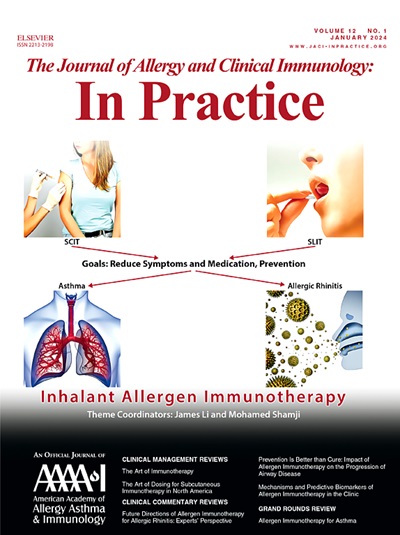If and When to Consider Prophylactic Immunoglobulin Replacement Therapy in Secondary Hypogammaglobulinemia
IF 8.2
1区 医学
Q1 ALLERGY
Journal of Allergy and Clinical Immunology-In Practice
Pub Date : 2025-03-01
DOI:10.1016/j.jaip.2024.12.024
引用次数: 0
Abstract
Secondary hypogammaglobulinemia (SHG), or decreased IgG levels due to reduced production or increased loss caused by medications or underlying conditions, can be associated with increased infection risk. Although immunoglobulin replacement therapy (IgRT) is generally accepted as a strategy to help prevent recurrent bacterial infections in SHG, controversy exists as to whether it should be initiated to prevent the first occurrence of infection. This question has been raised particularly in the setting of anti-CD20 therapy, solid organ transplant, and B-cell malignancies and their treatments once IgG levels fall below 300 to 400 mg/dL. This article reviews the evidence for and against initiating IgRT in these settings, as well as associated considerations for evaluation and monitoring. Although it is relatively clear that infection risk increases with decreasing IgG levels, the exact contribution of SHG to overall infection risk and the protective benefit of IgRT in the absence of infections remain unclear. In the absence of clear consensus, shared decision-making is often needed to determine if and when to initiate IgRT.
过敏争议:是否以及何时考虑继发性低丙种球蛋白血症的预防性免疫球蛋白替代治疗。
继发性低丙种球蛋白血症,或由于药物或基础疾病引起的IgG产生减少或损失增加而导致IgG水平降低,可与感染风险增加有关。虽然免疫球蛋白替代疗法(IgRT)被普遍接受为帮助预防SHG复发性细菌感染的策略,但关于是否应该开始预防首次感染的发生存在争议。这个问题尤其在抗cd20治疗、实体器官移植和b细胞恶性肿瘤及其IgG水平低于300- 400mg /dL的治疗中被提出。本文回顾了支持和反对在这些情况下启动IgRT的证据,以及评估和监测的相关考虑因素。虽然感染风险随着IgG水平的降低而增加是相对清楚的,但SHG对总体感染风险的确切贡献以及IgRT在没有感染的情况下的保护作用仍不清楚。在缺乏明确共识的情况下,通常需要共同决策来确定是否以及何时启动IgRT。
本文章由计算机程序翻译,如有差异,请以英文原文为准。
求助全文
约1分钟内获得全文
求助全文
来源期刊

Journal of Allergy and Clinical Immunology-In Practice
ALLERGYIMMUNOLOGY-IMMUNOLOGY
CiteScore
11.10
自引率
9.60%
发文量
683
审稿时长
50 days
期刊介绍:
JACI: In Practice is an official publication of the American Academy of Allergy, Asthma & Immunology (AAAAI). It is a companion title to The Journal of Allergy and Clinical Immunology, and it aims to provide timely clinical papers, case reports, and management recommendations to clinical allergists and other physicians dealing with allergic and immunologic diseases in their practice. The mission of JACI: In Practice is to offer valid and impactful information that supports evidence-based clinical decisions in the diagnosis and management of asthma, allergies, immunologic conditions, and related diseases.
This journal publishes articles on various conditions treated by allergist-immunologists, including food allergy, respiratory disorders (such as asthma, rhinitis, nasal polyps, sinusitis, cough, ABPA, and hypersensitivity pneumonitis), drug allergy, insect sting allergy, anaphylaxis, dermatologic disorders (such as atopic dermatitis, contact dermatitis, urticaria, angioedema, and HAE), immunodeficiency, autoinflammatory syndromes, eosinophilic disorders, and mast cell disorders.
The focus of the journal is on providing cutting-edge clinical information that practitioners can use in their everyday practice or to acquire new knowledge and skills for the benefit of their patients. However, mechanistic or translational studies without immediate or near future clinical relevance, as well as animal studies, are not within the scope of the journal.
 求助内容:
求助内容: 应助结果提醒方式:
应助结果提醒方式:


